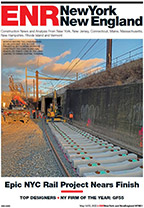N ew York City building officials imposed $64,000 fines against a crane operator and a contractor for failing to inspect and improperly operating a mobile crane that collapsed in the borough of Queens. The accident injured seven workers on an apartment-building jobsite on Jan. 9.
"The operator was attempting to lift a load of more than double the weight capacity for this particular crane," said Robert LiMandri, the buildings commissioner, in a statement.
At the project site on Jan. 9, Paul Geer, the crane operator, told buildings investigators that he could not see the load he was picking up during the lift.
"I could only see the boom," said Geer. This claim was later affirmed by LiMandri's statement that preliminary investigations showed the operator was unable to see the load and attempting to lift materials outside an approved loading zone.
Geer and contractor Cross Country Construction LLC each were cited for five violations on account of the collapse, officials said. Developer TF Cornerstone and site safety manager Arthur Covelli were cited for failing to safeguard people and property during construction. Officials from both companies did not immediately respond to calls for comment. It is not clear if they will contest the fines.
Though not a cause of life-threatening injuries, the collapse is the most recent of several incidents in New York City, one of which resulted in a death last April.
The accidents come despite 2012's tougher New York City regulations for crane operators. Requirements include more frequent exams, a measure that gained support following two deadly 2008 crane collapses that led to manslaughter charges but ended with acquittals. Other 2012 regulations increase oversight, expand check lists and require more than 4,000 hours of crane-inspector training.
To retain their licenses in the city, Class A- and Class B-licensed operators must pass by July a national crane exam accredited by either the National Commission for Certifying Agencies or the American National Standards Institute.




Post a comment to this article
Report Abusive Comment